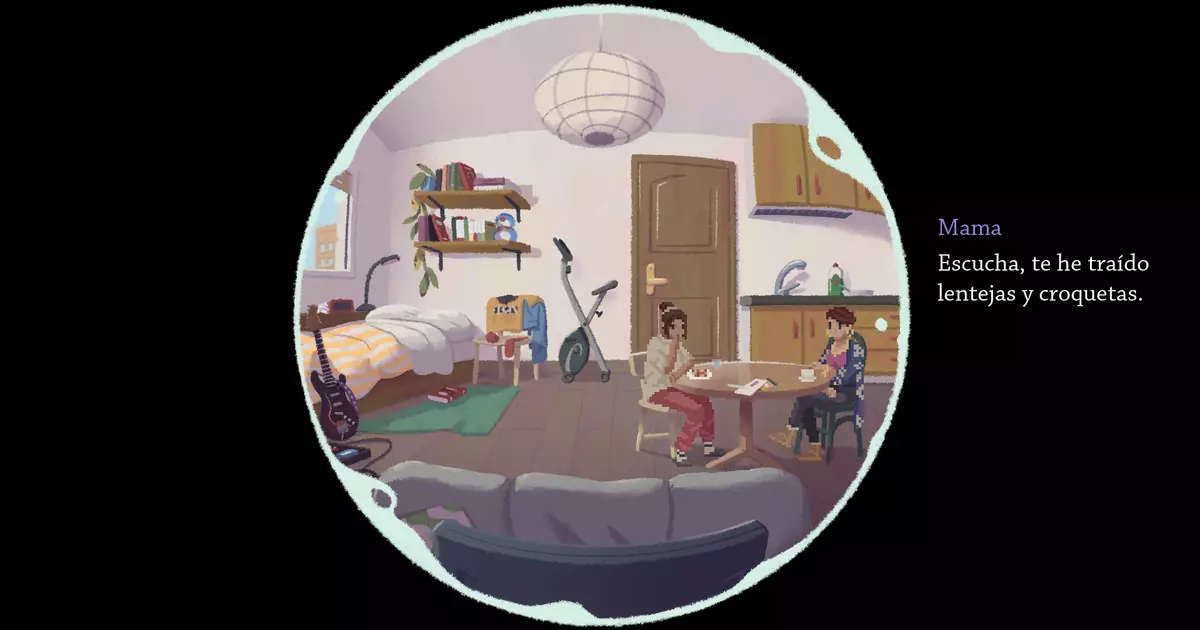“Vendrán Las Aves” translates to “The Birds Will Come,” a title that aptly reflects the central themes of hope and rejuvenation within the game. Developed by Francisco Riolobos, Chuso Montero, and Deconstructeam, this game is a poignant exploration of burnout recovery, presented in an engaging format that tackles serious issues with a gentle touch. Set within the confines of a minimalistic, one-room apartment viewed through a snowglobe lens, players are invited to step into the shoes of a weary protagonist who has just exited a challenging job.
As an artistic interpretation, the game deftly conveys the emotional turmoil associated with burnout—namely the mixture of exhaustion and the desire for renewal. By employing a “slice of life tamagotchi” format, it eases players into the complexity of mental health struggles. Unlike traditional gaming narratives that glorify constant action and triumph, “Vendrán Las Aves” creates a space for quiet reflection, allowing players to understand the subtle rhythms of daily life and recuperation.
At the core of “Vendrán Las Aves” lies a simple yet striking game mechanic—resource allocation. Each day, players manage a pool of energy points that must be divided among basic activities: eating, watching television, doing laundry, or attempting to engage with the new guitar. The challenge comes from the reality that the protagonist often feels drained, forcing players to make tough choices about how to spend finite energy.
This gameplay mechanic mirrors the real-life experience of individuals grappling with burnout, where the overwhelming weight of decision-making can feel exhausting. It highlights the tension between responsibility and self-care, illustrating that sometimes, opting for convenience like ordering takeaway may overshadow more fulfilling activities. This aspect resonates deeply with many players, ripe for introspection and self-acknowledgment of their own mental states.
One of the game’s underlying messages is the crucial role that external support plays in recovery. When characters reach out for assistance—a visit from a caring parent bearing comforting food, for instance—the impacts are substantial. This feature serves as a subtle reminder that asking for help is not a sign of weakness but rather an adaptive choice in stressful situations.
The interaction with caring characters in the game enriches the narrative, reinforcing the idea that healing often requires community, understanding, and connection. Players are beckoned to reflect on their support systems outside the game, fostering thoughts about their real-life relationships and interactions.
In many ways, “Vendrán Las Aves” acts as a mirror to one’s own experiences with burnout, validating feelings of helplessness, isolation, and ambivalence that often accompany such states. For players familiar with these sentiments, navigating the seemingly mundane tasks of life through gameplay can evoke a powerful sense of recognition and relief.
This game’s exploration of burnout is framed not merely as an individual affliction but as a symptom of broader societal pressures and expectations. While the protagonist grapples with their personal challenges, the nuances of institutional factors that contribute to their state are hinted at within the dialogue, creating a rich environment for discourse.
“Vendrán Las Aves” culminates in an uplifting narrative, providing a semblance of closure without offering a neatly tied resolution. This is reflective of real-life challenges, where individuals often must navigate complex emotional landscapes without clear outcomes.
However, while the game provides a nuanced depiction of burnout, it’s essential to clarify that it does not serve as a substitute for professional mental health resources. Players who find themselves resonating with the protagonist’s struggles may benefit from additional support or guidance, which underscores the importance of mental wellness practices.
“Vendrán Las Aves” thrives on its ability to connect with players emotionally and thoughtfully. By engaging with the themes of burnout and resilience through a simple yet profound gameplay design, it not only entertains but invites players to engage with their own mental health journeys. The game offers a compassionate perspective on recovery, leaving players with a lingering message: hope is on the horizon, just like the birds that will eventually come.


Leave a Reply